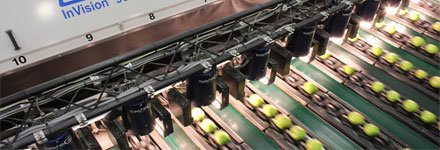
Research and development is a lonely business but Hamish Kennedy, managing director at Compac Sorting Equipment probably won’t mind. He eat, drinks and probably dreams R&D.
He is also a serial optimist. “One of the problems with R&D is you have to be able to be optimist but you also have to be able to continue to fund your R&D,” he says.
The challenge is keeping the optimism as well as balancing the realism of having to sustain the R&D, he says.
“We have managed to grow rapidly based on the strength of our innovation. We invest a lot in R&D – we are passionate about improving our technology.
“Our technology transforms people’s business in lifting the quality of the product,” Kennedy told Idealog.
But for Compac, the hardyards have paid off. The company has grown from a small company serving the needs of Te Puke fruit packers, to a company of 400 of which 70 are R&D folks.
Kennedy says the company’s revenue is close to hitting the $100m. It sells to over 50 countries around the globe and its machines have been used to sort mangoes, mandarins, cherries, oranges and kiwifruit.
The company’s innovation is one that has revolutionised the horticulture industry, reducing the amount of time spent picking out the “bad apples” from the good ones. The oddly-shaped apple from the perfect one. The luscious red to the not-so-attractive red.
At one of its client Mr Apple’s packhouse in central Hawkes Bay, some 85,000 bags of apples are packed on a good day – the apples have to be the right weight, the right number of apples with the right diameter and must meet the 1 kg limit. One underweight bag could mean a whole container of about 20,000 bags of apples being rejected.
In short, the “robots” in equipment produce by Compac has allowed the packing house to reduce the human component in its production line that has carved Compac a credible space in the sorting equipment world.
“We have looked at different equipment from around the world, including Compac’s competitors. Compac has the leading edge,” says Andrew van Workum, CEO of Mr Apple, Hawkes Bay’s largest apple producer and the country’s largest apple exporter. He adds the machinery has allowed the company to reduce its cost input, and enhance efficiency.
Kennedy says: “Our technology does transform people’s business in the quality of their produce, and the efficiency of their production because of the technology they are employing.”
And it is not everday that a company gets the tick from boffins.
Compac has just won the inaugural Horticulture Innovation Award, granted by the International Society of Horticultural Science, an organisation representing 7,000 scientists whose research produced better food and produce for the world.
The award is the highest recognition granted by the ISHS Council “to a person or institution for an exceptional contribution to horticulture innovation”.
The award specifically focuses on ideas which create new products and services that are seen as important landmarks in the progress of horticulture at an international level.
It also recognises the ability of Compac to integrate different technological platforms such as software, mechanical, electronic, optical and information engineering into horticultural applications.
Kennedy was quite stunned by the award. The company’s focus on R&D has been central to its success, he says.
This is a company that has 70 of its 400 global employee involved in research and development.
The company has over the years dipped into funding provided by the government to help NZ companies lift the technological capability. Since 1999, the company has received over $4 million in funding from the government, some of it matched by the company’s own investment.
From machines that sort kiwifruit, the company’s trajectory up the innovation ladder just keeps getting higher.
Among Compac’s trophy projects is a line sorting 50,000 cherries every minute by size, shape, colour, softness and surface defects for a client in California.
It showpiece technology InVision can capture up to 30 images of each mandarin as it rotates, allowing the software to capture a 3-D model of each fruit in a matter of seconds. The fruit can then be assigned to a correct packaging destination.
This piece of technology helped Compac scoop a major job from Paramount Citrus Wonderful Halos Plant in Delano, California (a mandarin packhouse). The Paramount Citrus facility is by far the largest (at 14 acres) and the most advanced postharvest facility in the world. Paramount made the decision to exclusively use Compac technology for their automated sorting.
“We won this contract on the back of our proven track record, our advanced automation and our ability to deliver superior, tailored solutions to meet our client’s needs,” says Kennedy.




